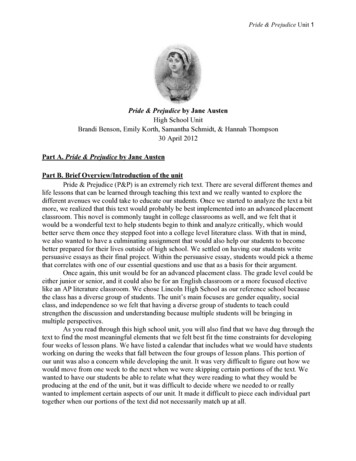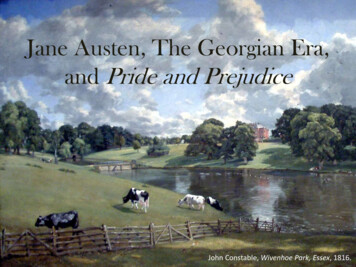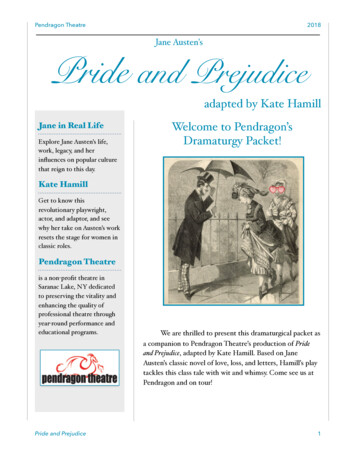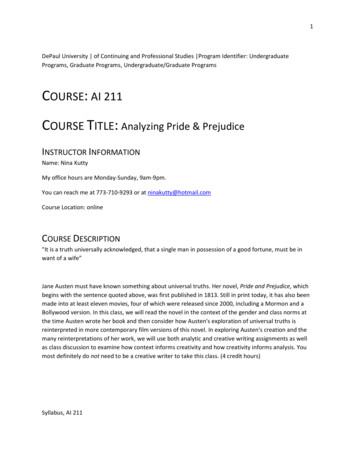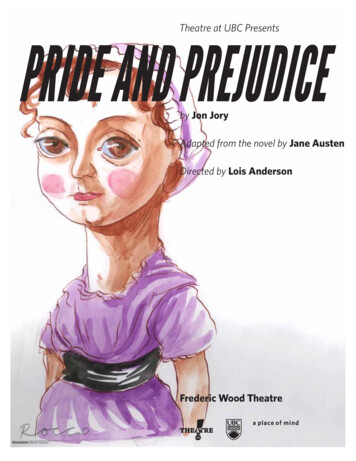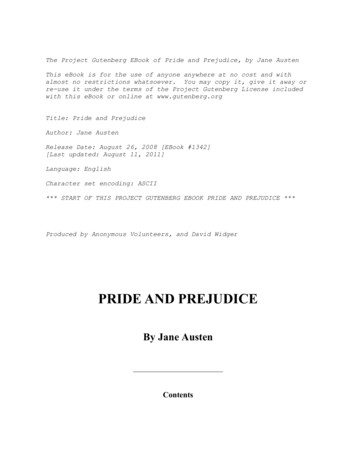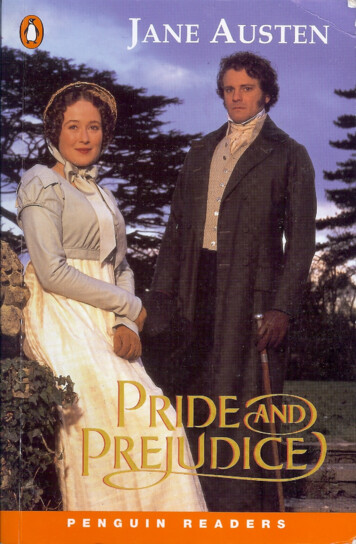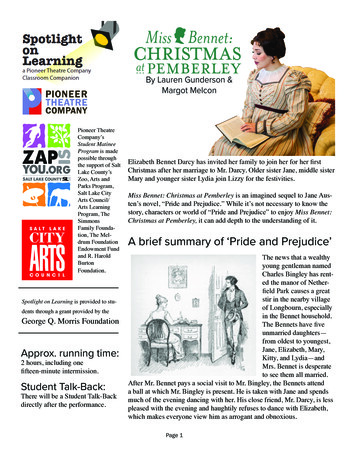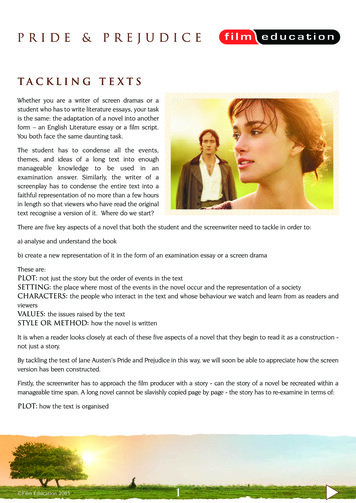
Transcription
PRIDE AND PREJUDICEBy Jane AustenChapter 1It is a truth universally acknowledged, that a single man in possessionof a good fortune, must be in want of a wife.However little known the feelings or views of such a man may be on hisfirst entering a neighbourhood, this truth is so well fixed in the mindsof the surrounding families, that he is considered the rightful propertyof some one or other of their daughters."My dear Mr. Bennet," said his lady to him one day, "have you heard thatNetherfield Park is let at last?"Mr. Bennet replied that he had not."But it is," returned she; "for Mrs. Long has just been here, and shetold me all about it."Mr. Bennet made no answer."Do you not want to know who has taken it?" cried his wife impatiently." You want to tell me, and I have no objection to hearing it."This was invitation enough."Why, my dear, you must know, Mrs. Long says that Netherfield is takenby a young man of large fortune from the north of England; that he camedown on Monday in a chaise and four to see the place, and was so muchdelighted with it, that he agreed with Mr. Morris immediately; that heis to take possession before Michaelmas, and some of his servants are tobe in the house by the end of next week.""What is his name?""Bingley.""Is he married or single?""Oh! Single, my dear, to be sure! A single man of large fortune; four orfive thousand a year. What a fine thing for our girls!""How so? How can it affect them?""My dear Mr. Bennet," replied his wife, "how can you be so tiresome! Youmust know that I am thinking of his marrying one of them.""Is that his design in settling here?""Design! Nonsense, how can you talk so! But it is very likely that he
may fall in love with one of them, and therefore you must visit him assoon as he comes.""I see no occasion for that. You and the girls may go, or you may sendthem by themselves, which perhaps will be still better, for as you areas handsome as any of them, Mr. Bingley may like you the best of theparty.""My dear, you flatter me. I certainly have had my share of beauty, butI do not pretend to be anything extraordinary now. When a woman has fivegrown-up daughters, she ought to give over thinking of her own beauty.""In such cases, a woman has not often much beauty to think of.""But, my dear, you must indeed go and see Mr. Bingley when he comes intothe neighbourhood.""It is more than I engage for, I assure you.""But consider your daughters. Only think what an establishment it wouldbe for one of them. Sir William and Lady Lucas are determined togo, merely on that account, for in general, you know, they visit nonewcomers. Indeed you must go, for it will be impossible for us tovisit him if you do not.""You are over-scrupulous, surely. I dare say Mr. Bingley will be veryglad to see you; and I will send a few lines by you to assure him of myhearty consent to his marrying whichever he chooses of the girls; thoughI must throw in a good word for my little Lizzy.""I desire you will do no such thing. Lizzy is not a bit better than theothers; and I am sure she is not half so handsome as Jane, nor half sogood-humoured as Lydia. But you are always giving her the preference.""They have none of them much to recommend them," replied he; "they areall silly and ignorant like other girls; but Lizzy has something more ofquickness than her sisters.""Mr. Bennet, how can you abuse your own children in such a way? Youtake delight in vexing me. You have no compassion for my poor nerves.""You mistake me, my dear. I have a high respect for your nerves. Theyare my old friends. I have heard you mention them with considerationthese last twenty years at least.""Ah, you do not know what I suffer.""But I hope you will get over it, and live to see many young men of fourthousand a year come into the neighbourhood.""It will be no use to us, if twenty such should come, since you will notvisit them.""Depend upon it, my dear, that when there are twenty, I will visit themall."Mr. Bennet was so odd a mixture of quick parts, sarcastic humour,
reserve, and caprice, that the experience of three-and-twenty years hadbeen insufficient to make his wife understand his character. Her mindwas less difficult to develop. She was a woman of mean understanding,little information, and uncertain temper. When she was discontented,she fancied herself nervous. The business of her life was to get herdaughters married; its solace was visiting and news.Chapter 2Mr. Bennet was among the earliest of those who waited on Mr. Bingley. Hehad always intended to visit him, though to the last always assuringhis wife that he should not go; and till the evening after the visit waspaid she had no knowledge of it. It was then disclosed in the followingmanner. Observing his second daughter employed in trimming a hat, hesuddenly addressed her with:"I hope Mr. Bingley will like it, Lizzy.""We are not in a way to know what Mr. Bingley likes," said her motherresentfully, "since we are not to visit.""But you forget, mamma," said Elizabeth, "that we shall meet him at theassemblies, and that Mrs. Long promised to introduce him.""I do not believe Mrs. Long will do any such thing. She has two niecesof her own. She is a selfish, hypocritical woman, and I have no opinionof her.""No more have I," said Mr. Bennet; "and I am glad to find that you donot depend on her serving you."Mrs. Bennet deigned not to make any reply, but, unable to containherself, began scolding one of her daughters."Don't keep coughing so, Kitty, for Heaven's sake! Have a littlecompassion on my nerves. You tear them to pieces.""Kitty has no discretion in her coughs," said her father; "she timesthem ill.""I do not cough for my own amusement," replied Kitty fretfully. "When isyour next ball to be, Lizzy?""To-morrow fortnight.""Aye, so it is," cried her mother, "and Mrs. Long does not come backtill the day before; so it will be impossible for her to introduce him,for she will not know him herself.""Then, my dear, you may have the advantage of your friend, and introduceMr. Bingley to her .""Impossible, Mr. Bennet, impossible, when I am not acquainted with himmyself; how can you be so teasing?"
"I honour your circumspection. A fortnight's acquaintance is certainlyvery little. One cannot know what a man really is by the end of afortnight. But if we do not venture somebody else will; and after all,Mrs. Long and her daughters must stand their chance; and, therefore, asshe will think it an act of kindness, if you decline the office, I willtake it on myself."The girls stared at their father. Mrs. Bennet said only, "Nonsense,nonsense!""What can be the meaning of that emphatic exclamation?" cried he. "Doyou consider the forms of introduction, and the stress that is laid onthem, as nonsense? I cannot quite agree with you there . What say you,Mary? For you are a young lady of deep reflection, I know, and readgreat books and make extracts."Mary wished to say something sensible, but knew not how."While Mary is adjusting her ideas," he continued, "let us return to Mr.Bingley.""I am sick of Mr. Bingley," cried his wife."I am sorry to hear that ; but why did not you tell me that before? IfI had known as much this morning I certainly would not have calledon him. It is very unlucky; but as I have actually paid the visit, wecannot escape the acquaintance now."The astonishment of the ladies was just what he wished; that of Mrs.Bennet perhaps surpassing the rest; though, when the first tumult of joywas over, she began to declare that it was what she had expected all thewhile."How good it was in you, my dear Mr. Bennet! But I knew I shouldpersuade you at last. I was sure you loved your girls too well toneglect such an acquaintance. Well, how pleased I am! and it is such agood joke, too, that you should have gone this morning and never said aword about it till now.""Now, Kitty, you may cough as much as you choose," said Mr. Bennet; and,as he spoke, he left the room, fatigued with the raptures of his wife."What an excellent father you have, girls!" said she, when the door wasshut. "I do not know how you will ever make him amends for his kindness;or me, either, for that matter. At our time of life it is not sopleasant, I can tell you, to be making new acquaintances every day; butfor your sakes, we would do anything. Lydia, my love, though you arethe youngest, I dare say Mr. Bingley will dance with you at the nextball.""Oh!" said Lydia stoutly, "I am not afraid; for though I am theyoungest, I'm the tallest."The rest of the evening was spent in conjecturing how soon he wouldreturn Mr. Bennet's visit, and determining when they should ask him todinner.
Chapter 3Not all that Mrs. Bennet, however, with the assistance of her fivedaughters, could ask on the subject, was sufficient to draw from herhusband any satisfactory description of Mr. Bingley. They attacked himin various ways--with barefaced questions, ingenious suppositions, anddistant surmises; but he eluded the skill of them all, and they were atlast obliged to accept the second-hand intelligence of their neighbour,Lady Lucas. Her report was highly favourable. Sir William had beendelighted with him. He was quite young, wonderfully handsome, extremelyagreeable, and, to crown the whole, he meant to be at the next assemblywith a large party. Nothing could be more delightful! To be fond ofdancing was a certain step towards falling in love; and very livelyhopes of Mr. Bingley's heart were entertained."If I can but see one of my daughters happily settled at Netherfield,"said Mrs. Bennet to her husband, "and all the others equally wellmarried, I shall have nothing to wish for."In a few days Mr. Bingley returned Mr. Bennet's visit, and sat aboutten minutes with him in his library. He had entertained hopes of beingadmitted to a sight of the young ladies, of whose beauty he hadheard much; but he saw only the father. The ladies were somewhat morefortunate, for they had the advantage of ascertaining from an upperwindow that he wore a blue coat, and rode a black horse.An invitation to dinner was soon afterwards dispatched; and alreadyhad Mrs. Bennet planned the courses that were to do credit to herhousekeeping, when an answer arrived which deferred it all. Mr. Bingleywas obliged to be in town the following day, and, consequently, unableto accept the honour of their invitation, etc. Mrs. Bennet was quitedisconcerted. She could not imagine what business he could have in townso soon after his arrival in Hertfordshire; and she began to fear thathe might be always flying about from one place to another, and neversettled at Netherfield as he ought to be. Lady Lucas quieted her fearsa little by starting the idea of his being gone to London only to geta large party for the ball; and a report soon followed that Mr. Bingleywas to bring twelve ladies and seven gentlemen with him to the assembly.The girls grieved over such a number of ladies, but were comforted theday before the ball by hearing, that instead of twelve he brought onlysix with him from London--his five sisters and a cousin. And whenthe party entered the assembly room it consisted of only fivealtogether--Mr. Bingley, his two sisters, the husband of the eldest, andanother young man.Mr. Bingley was good-looking and gentlemanlike; he had a pleasantcountenance, and easy, unaffected manners. His sisters were fine women,with an air of decided fashion. His brother-in-law, Mr. Hurst, merelylooked the gentleman; but his friend Mr. Darcy soon drew the attentionof the room by his fine, tall person, handsome features, noble mien, andthe report which was in general circulation within five minutesafter his entrance, of his having ten thousand a year. The gentlemenpronounced him to be a fine figure of a man, the ladies declared he
was much handsomer than Mr. Bingley, and he was looked at with greatadmiration for about half the evening, till his manners gave a disgustwhich turned the tide of his popularity; for he was discovered to beproud; to be above his company, and above being pleased; and not allhis large estate in Derbyshire could then save him from having a mostforbidding, disagreeable countenance, and being unworthy to be comparedwith his friend.Mr. Bingley had soon made himself acquainted with all the principalpeople in the room; he was lively and unreserved, danced every dance,was angry that the ball closed so early, and talked of givingone himself at Netherfield. Such amiable qualities must speak forthemselves. What a contrast between him and his friend! Mr. Darcy dancedonly once with Mrs. Hurst and once with Miss Bingley, declined beingintroduced to any other lady, and spent the rest of the evening inwalking about the room, speaking occasionally to one of his own party.His character was decided. He was the proudest, most disagreeable manin the world, and everybody hoped that he would never come there again.Amongst the most violent against him was Mrs. Bennet, whose dislike ofhis general behaviour was sharpened into particular resentment by hishaving slighted one of her daughters.Elizabeth Bennet had been obliged, by the scarcity of gentlemen, to sitdown for two dances; and during part of that time, Mr. Darcy had beenstanding near enough for her to hear a conversation between him and Mr.Bingley, who came from the dance for a few minutes, to press his friendto join it."Come, Darcy," said he, "I must have you dance. I hate to see youstanding about by yourself in this stupid manner. You had much betterdance.""I certainly shall not. You know how I detest it, unless I amparticularly acquainted with my partner. At such an assembly as thisit would be insupportable. Your sisters are engaged, and there is notanother woman in the room whom it would not be a punishment to me tostand up with.""I would not be so fastidious as you are," cried Mr. Bingley, "for akingdom! Upon my honour, I never met with so many pleasant girls inmy life as I have this evening; and there are several of them you seeuncommonly pretty."" You are dancing with the only handsome girl in the room," said Mr.Darcy, looking at the eldest Miss Bennet."Oh! She is the most beautiful creature I ever beheld! But there is oneof her sisters sitting down just behind you, who is very pretty, and Idare say very agreeable. Do let me ask my partner to introduce you.""Which do you mean?" and turning round he looked for a moment atElizabeth, till catching her eye, he withdrew his own and coldly said:"She is tolerable, but not handsome enough to tempt me ; I am in nohumour at present to give consequence to young ladies who are slightedby other men. You had better return to your partner and enjoy hersmiles, for you are wasting your time with me."
Mr. Bingley followed his advice. Mr. Darcy walked off; and Elizabethremained with no very cordial feelings toward him. She told the story,however, with great spirit among her friends; for she had a lively,playful disposition, which delighted in anything ridiculous.The evening altogether passed off pleasantly to the whole family. Mrs.Bennet had seen her eldest daughter much admired by the Netherfieldparty. Mr. Bingley had danced with her twice, and she had beendistinguished by his sisters. Jane was as much gratified by this asher mother could be, though in a quieter way. Elizabeth felt Jane'spleasure. Mary had heard herself mentioned to Miss Bingley as the mostaccomplished girl in the neighbourhood; and Catherine and Lydia had beenfortunate enough never to be without partners, which was all that theyhad yet learnt to care for at a ball. They returned, therefore, in goodspirits to Longbourn, the village where they lived, and of which theywere the principal inhabitants. They found Mr. Bennet still up. Witha book he was regardless of time; and on the present occasion he had agood deal of curiosity as to the event of an evening which had raisedsuch splendid expectations. He had rather hoped that his wife's views onthe stranger would be disappointed; but he soon found out that he had adifferent story to hear."Oh! my dear Mr. Bennet," as she entered the room, "we have had a mostdelightful evening, a most excellent ball. I wish you had been there.Jane was so admired, nothing could be like it. Everybody said how wellshe looked; and Mr. Bingley thought her quite beautiful, and danced withher twice! Only think of that , my dear; he actually danced with hertwice! and she was the only creature in the room that he asked a secondtime. First of all, he asked Miss Lucas. I was so vexed to see him standup with her! But, however, he did not admire her at all; indeed, nobodycan, you know; and he seemed quite struck with Jane as she was goingdown the dance. So he inquired who she was, and got introduced, andasked her for the two next. Then the two third he danced with Miss King,and the two fourth with Maria Lucas, and the two fifth with Jane again,and the two sixth with Lizzy, and the Boulanger --""If he had had any compassion for me ," cried her husband impatiently,"he would not have danced half so much! For God's sake, say no more ofhis partners. Oh that he had sprained his ankle in the first dance!""Oh! my dear, I am quite delighted with him. He is so excessivelyhandsome! And his sisters are charming women. I never in my life sawanything more elegant than their dresses. I dare say the lace upon Mrs.Hurst's gown--"Here she was interrupted again. Mr. Bennet protested against anydescription of finery. She was therefore obliged to seek another branchof the subject, and related, with much bitterness of spirit and someexaggeration, the shocking rudeness of Mr. Darcy."But I can assure you," she added, "that Lizzy does not lose much by notsuiting his fancy; for he is a most disagreeable, horrid man, not atall worth pleasing. So high and so conceited that there was no enduringhim! He walked here, and he walked there, fancying himself so verygreat! Not handsome enough to dance with! I wish you had been there, mydear, to have given him one of your set-downs. I quite detest the man."
Chapter 4When Jane and Elizabeth were alone, the former, who had been cautious inher praise of Mr. Bingley before, expressed to her sister just how verymuch she admired him."He is just what a young man ought to be," said she, "sensible,good-humoured, lively; and I never saw such happy manners!--so muchease, with such perfect good breeding!""He is also handsome," replied Elizabeth, "which a young man oughtlikewise to be, if he possibly can. His character is thereby complete.""I was very much flattered by his asking me to dance a second time. Idid not expect such a compliment.""Did not you? I did for you. But that is one great difference betweenus. Compliments always take you by surprise, and me never. Whatcould be more natural than his asking you again? He could not helpseeing that you were about five times as pretty as every other womanin the room. No thanks to his gallantry for that. Well, he certainly isvery agreeable, and I give you leave to like him. You have liked many astupider person.""Dear Lizzy!""Oh! you are a great deal too apt, you know, to like people in general.You never see a fault in anybody. All the world are good and agreeablein your eyes. I never heard you speak ill of a human being in yourlife.""I would not wish to be hasty in censuring anyone; but I always speakwhat I think.""I know you do; and it is that which makes the wonder. With yourgood sense, to be so honestly blind to the follies and nonsense ofothers! Affectation of candour is common enough--one meets with iteverywhere. But to be candid without ostentation or design--to take thegood of everybody's character and make it still better, and say nothingof the bad--belongs to you alone. And so you like this man's sisters,too, do you? Their manners are not equal to his.""Certainly not--at first. But they are very pleasing women when youconverse with them. Miss Bingley is to live with her brother, and keephis house; and I am much mistaken if we shall not find a very charmingneighbour in her."Elizabeth listened in silence, but was not convinced; their behaviour atthe assembly had not been calculated to please in general; and with morequickness of observation and less pliancy of temper than her sister,and with a judgement too unassailed by any attention to herself, shewas very little disposed to approve them. They were in fact very fineladies; not deficient in good humour when they were pleased, nor in thepower of making themselves agreeable when they chose it, but proud and
conceited. They were rather handsome, had been educated in one of thefirst private seminaries in town, had a fortune of twenty thousandpounds, were in the habit of spending more than they ought, and ofassociating with people of rank, and were therefore in every respectentitled to think well of themselves, and meanly of others. They were ofa respectable family in the north of England; a circumstance more deeplyimpressed on their memories than that their brother's fortune and theirown had been acquired by trade.Mr. Bingley inherited property to the amount of nearly a hundredthousand pounds from his father, who had intended to purchase anestate, but did not live to do it. Mr. Bingley intended it likewise, andsometimes made choice of his county; but as he was now provided with agood house and the liberty of a manor, it was doubtful to many of thosewho best knew the easiness of his temper, whether he might not spend theremainder of his days at Netherfield, and leave the next generation topurchase.His sisters were anxious for his having an estate of his own; but,though he was now only established as a tenant, Miss Bingley was by nomeans unwilling to preside at his table--nor was Mrs. Hurst, who hadmarried a man of more fashion than fortune, less disposed to considerhis house as her home when it suited her. Mr. Bingley had not been ofage two years, when he was tempted by an accidental recommendationto look at Netherfield House. He did look at it, and into it forhalf-an-hour--was pleased with the situation and the principalrooms, satisfied with what the owner said in its praise, and took itimmediately.Between him and Darcy there was a very steady friendship, in spite ofgreat opposition of character. Bingley was endeared to Darcy by theeasiness, openness, and ductility of his temper, though no dispositioncould offer a greater contrast to his own, and though with his own henever appeared dissatisfied. On the strength of Darcy's regard, Bingleyhad the firmest reliance, and of his judgement the highest opinion.In understanding, Darcy was the superior. Bingley was by no meansdeficient, but Darcy was clever. He was at the same time haughty,reserved, and fastidious, and his manners, though well-bred, were notinviting. In that respect his friend had greatly the advantage. Bingleywas sure of being liked wherever he appeared, Darcy was continuallygiving offense.The manner in which they spoke of the Meryton assembly was sufficientlycharacteristic. Bingley had never met with more pleasant people orprettier girls in his life; everybody had been most kind and attentiveto him; there had been no formality, no stiffness; he had soon feltacquainted with all the room; and, as to Miss Bennet, he could notconceive an angel more beautiful. Darcy, on the contrary, had seen acollection of people in whom there was little beauty and no fashion, fornone of whom he had felt the smallest interest, and from none receivedeither attention or pleasure. Miss Bennet he acknowledged to be pretty,but she smiled too much.Mrs. Hurst and her sister allowed it to be so--but still they admiredher and liked her, and pronounced her to be a sweet girl, and onewhom they would not object to know more of. Miss Bennet was thereforeestablished as a sweet girl, and their brother felt authorized by such
commendation to think of her as he chose.Chapter 5Within a short walk of Longbourn lived a family with whom the Bennetswere particularly intimate. Sir William Lucas had been formerly in tradein Meryton, where he had made a tolerable fortune, and risen to thehonour of knighthood by an address to the king during his mayoralty.The distinction had perhaps been felt too strongly. It had given him adisgust to his business, and to his residence in a small market town;and, in quitting them both, he had removed with his family to a houseabout a mile from Meryton, denominated from that period Lucas Lodge,where he could think with pleasure of his own importance, and,unshackled by business, occupy himself solely in being civil to allthe world. For, though elated by his rank, it did not render himsupercilious; on the contrary, he was all attention to everybody. Bynature inoffensive, friendly, and obliging, his presentation at St.James's had made him courteous.Lady Lucas was a very good kind of woman, not too clever to be avaluable neighbour to Mrs. Bennet. They had several children. The eldestof them, a sensible, intelligent young woman, about twenty-seven, wasElizabeth's intimate friend.That the Miss Lucases and the Miss Bennets should meet to talk overa ball was absolutely necessary; and the morning after the assemblybrought the former to Longbourn to hear and to communicate." You began the evening well, Charlotte," said Mrs. Bennet with civilself-command to Miss Lucas. " You were Mr. Bingley's first choice.""Yes; but he seemed to like his second better.""Oh! you mean Jane, I suppose, because he danced with her twice. To besure that did seem as if he admired her--indeed I rather believe hedid --I heard something about it--but I hardly know what--somethingabout Mr. Robinson.""Perhaps you mean what I overheard between him and Mr. Robinson; did notI mention it to you? Mr. Robinson's asking him how he liked our Merytonassemblies, and whether he did not think there were a great manypretty women in the room, and which he thought the prettiest? and hisanswering immediately to the last question: 'Oh! the eldest Miss Bennet,beyond a doubt; there cannot be two opinions on that point.'""Upon my word! Well, that is very decided indeed--that does seem asif--but, however, it may all come to nothing, you know."" My overhearings were more to the purpose than yours , Eliza," saidCharlotte. "Mr. Darcy is not so well worth listening to as his friend,is he?--poor Eliza!--to be only just tolerable .""I beg you would not put it into Lizzy's head to be vexed by hisill-treatment, for he is such a disagreeable man, that it would be quite
a misfortune to be liked by him. Mrs. Long told me last night that hesat close to her for half-an-hour without once opening his lips.""Are you quite sure, ma'am?--is not there a little mistake?" said Jane."I certainly saw Mr. Darcy speaking to her.""Aye--because she asked him at last how he liked Netherfield, and hecould not help answering her; but she said he seemed quite angry atbeing spoke to.""Miss Bingley told me," said Jane, "that he never speaks much,unless among his intimate acquaintances. With them he is remarkablyagreeable.""I do not believe a word of it, my dear. If he had been so veryagreeable, he would have talked to Mrs. Long. But I can guess how itwas; everybody says that he is eat up with pride, and I dare say he hadheard somehow that Mrs. Long does not keep a carriage, and had come tothe ball in a hack chaise.""I do not mind his not talking to Mrs. Long," said Miss Lucas, "but Iwish he had danced with Eliza.""Another time, Lizzy," said her mother, "I would not dance with him ,if I were you.""I believe, ma'am, I may safely promise you never to dance with him.""His pride," said Miss Lucas, "does not offend me so much as prideoften does, because there is an excuse for it. One cannot wonder that sovery fine a young man, with family, fortune, everything in his favour,should think highly of himself. If I may so express it, he has a rightto be proud.""That is very true," replied Elizabeth, "and I could easily forgivehis pride, if he had not mortified mine .""Pride," observed Mary, who piqued herself upon the solidity of herreflections, "is a very common failing, I believe. By all that I haveever read, I am convinced that it is very common indeed; that humannature is particularly prone to it, and that there are very few of uswho do not cherish a feeling of self-complacency on the score of somequality or other, real or imaginary. Vanity and pride are differentthings, though the words are often used synonymously. A person maybe proud without being vain. Pride relates more to our opinion ofourselves, vanity to what we would have others think of us.""If I were as rich as Mr. Darcy," cried a young Lucas, who came withhis sisters, "I should not care how proud I was. I would keep a pack offoxhounds, and drink a bottle of wine a day.""Then you would drink a great deal more than you ought," said Mrs.Bennet; "and if I were to see you at it, I should take away your bottledirectly."The boy protested that she should not; she continued to declare that shewould, and the argument ended only with the visit.
Chapter 6The ladies of Longbourn soon waited on those of Netherfield. The visitwas soon returned in due form. Miss Bennet's pleasing manners grew onthe goodwill of Mrs. Hurst and Miss Bingley; and though the mother wasfound to be intolerable, and the younger sisters not worth speaking to,a wish of being better acquainted with them was expressed towardsthe two eldest. By Jane, this attention was received with the greatestpleasure, but Elizabeth still saw superciliousness in their treatmentof everybody, hardly excepting even her sister, and could not like them;though their kindness to Jane, such as it was, had a value as arising inall probability from the influence of their brother's admiration. Itwas generally evident whenever they met, that he did admire her andto her it was equally evident that Jane was yielding to the preferencewhich she had begun to entertain for him from the first, and was in away to be very much in l
PRIDE AND PREJUDICE By Jane Austen Chapter 1 It is a truth universally acknowledged, that a single man in possession of a good fortune, must be in want of a wife. However little known the feelings or views of such a man may be on his first entering a neighbourhood, this truth is so well fixed in the minds
